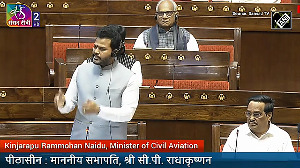And there are few people who know more about managing such a big operation than US Undersecretary of State for Management Henrietta H Fore, who helms 11 management bureaus and offices that have 7,200 fulltime employees and a combined budget of $3.6 billion.
Some management insights and tips from Fore, who was in Mumbai on Monday, March 5, to address students at the Narsee Monjee Institute of Management Studies, Vile Parle, northwest Mumbai.
Use of creative recruitment tools:
Fore said the State Department constantly looks out in different fields for people it can hire. "We are looking to people who are midway in their private sector careers and who may wish to try out foreign affairs and see if it is a good fit for them."
The State Department, like any good global entity, also reaches out to foundations and corporations and appeals to them to sponsor executives. Fore said the response has been quite positive and the result will be a win-win situation for the corporations and the State Department.
Equip your people with the right skills:
The State Department thinks its people are its best asset and makes sure that they have the right skills to carry out its mission. "The department has its own university -- the Foreign Service Institute -- that provides training in languages, leadership and management and country skills," Fore said.
The State Department has more than 400 classrooms courses and a distant learning programme, which includes several thousand commercial courses. Over 2,000 diplomats use these courses, which enable them to be familiar with various cultures when they step out.
Adapt to change; look differently as the world changes:
Fore agreed that the State Department's current global posture does not reflect the new front lines of diplomacy in transitional countries as in Asia, Africa, Latin America, and the Middle East. "Secretary of State Condoleezza Rice's bold initiatives of 'Transformational Diplomacy' requires we work with our partners in the world to build and sustain democratic, well governed states," she said.
In order to achieve such a transformation, she said it is important to focus on:
A global repositioning of diplomats;
Regionalising US functions for greater efficiencies and rightsizing its presence overseas; and
Localising US presence with smaller posts and virtual posts.
Rightsizing:
Fore said rightsizing a nation's presence overseas and investing on training and operational readiness and knowledge management are the keys.
"Rightsizing and regionalisation are key to transformation," she added. Conducting regular studies would also help. "As managers, you must appreciate that these studies are good ways to reassess staffing needs, goals and accomplishments," Fore told the management students.
IT initiatives:
This is the biggest asset for running any global operation, 24/7/365, Fore felt. "IT initiatives go hand-in-hand with your regional operations. Even if it is a small world already, there are ways in which we can get closer to each other. We must come up with approaches where we can capture culture, we have a feel of a place. This is something that needs to be thought about and innovated," she said.
Pair policy and economic considerations:
For whatever policy decision you take, make sure that you have a financial segment to it.
"The key to doing this is to rationalise how you allocate your human and financial resources. Have more people who understand the policy environment," she said.
Encourage entrepreneurs:
Fore felt any big global entity must encourage entrepreneurship.
By doing so, she said, both the entrepreneurs and the global business stand to gain.
"They drive skills and training. They might be small, but they teach you a lot about the region and help you understand the ground realities better," she added.
Give something back:
Summing it all up, Fore said running a global operation is to do business, serve your country in come capacity, and involve yourself in academia. "It is not just about taking profits from what you do," she told the students,"you must also give out something to the world."





